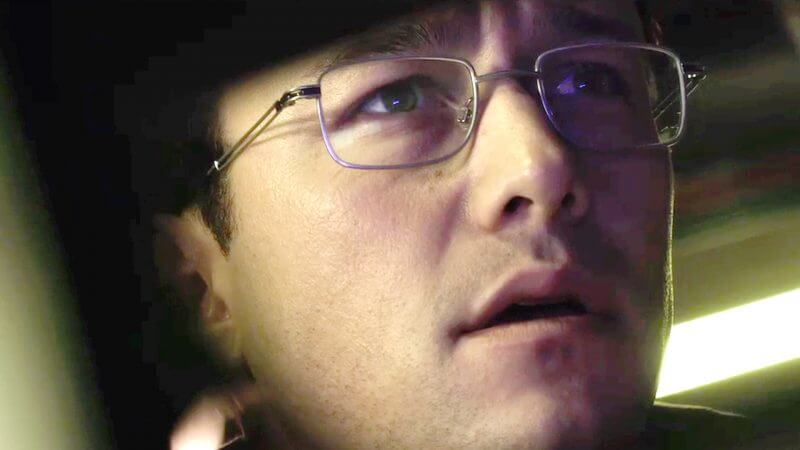Title: Snowden
Release Date: September 16, 2016
Studio: Open Road Films
Director: Oliver Stone
Release Format: Theatrical
Oliver Stone’s films are always important, but often frustrating. His movies are often at their best when they are as volatile and frustrated as the man himself. Stories like Born on The Fourth of July are passionate railings against American injustice. They practically shake with rage through the projector. However, sometimes he wears his kid gloves, leading to dreck like World Trade Center, and Wall Street: Money Never Sleeps. Snowden is a madding mix of both attitudes. It’s a film with a lot to say, that often stutters as it decides exactly how to say it. Perhaps it’s worried about being surveyed.
We meet former government computer expert Edward Snowden (Joseph Gordon-Levitt) in a hotel in China. He’s speaking to documentarian Laura Poitras (Melissa Leo) and a group of journalists about classified information he’s just leaked. He chronicles his meteoric ascension through the world of American espionage. As he finds himself deeper in the government’s web, he makes unconscionable discoveries about the surveillance of American citizens. His job consumes him to the point that it’s impossible for him to unplug at home. This greatly frustrates his girlfriend Lindsay (Shailene Woodley), who is desperate to live a life in spite of her government.
Structuring itself around the creation of Poitras’ oscar-winning documentary Citizenfour, Snowden lives in the shadow of its own story. It essentially acts as a two and a half hour re-enactment skit. That isn’t to say that it’s a bad re-enactment, but there’s an air of inauthenticity that runs throughout. Stone has made a very glossy, crisply colored film that often over-stylizes his serious subject matter. The film doesn’t ever really take a moment to acquaint the audience with the world of Snowden’s work. We’re thrown right in and expected to learn as we go. With that said, a couple of Stone’s visual choices are masterfully executed. Most impressive is a sequence that depicts the wide net that the government uses to link people with dangerous parties. It’s visceral, beautiful, and conveys Snowden’s message in a way that might be too over the top for a documentary.
What aids the film most of all is Joseph Gordon-Levitt’s stellar performance. It’s a restrained, complex turn that perfectly captures Snowden’s guilt and confusion. Despite a somewhat over the top (yet very consistent) voice affectation, Levitt completely disappears into the role. He’s a somewhat icy protagonist, but there’s a quiet earnestness to him that keeps him likable. Unfortunately, the same cannot be said for Woodley’s Lindsay. Woodley gives it her best, but the role is so badly written that she’s given nothing to work with. Once again, we’re given the typical biopic girlfriend who exists to complain about not being given enough attention. While certain elements of that are understandable in context, these two go through the same dramatic beats over and over. It’s a wonky love story that pads out an already long film.
Meanwhile, a parade of character actors is all over the map with their supporting roles. Keith Stanfield, Melissa Leo, and Nicholas Cage are fairly textured, but Rhys Ifans and especially Timothy Olyphant are cartoon characters. Olyphant, in particular, seems to think he’s in a different movie, mugging and contorting his face as a sleazy spy. Acting aside, we never really get to know these people beyond the performers playing them. Most of them eventually become dispensaries for technobabble. They get Snowden into a corner, rattle off their point of view, and then go on their merry way.
Stone also can’t help but make the whole piece cloyingly satisfied with itself. Instead of choosing a powerful moment to end on, the film throws Snowden a fifteen minute thank you parade. It’s an obnoxious, soundbite ridden sequence that culminates with Stone literally applauding for himself. Give me a break. It robs the audience of an opportunity to take in the moral ambiguity of Snowden’s actions while leaving the theater.
Snowden ultimately can’t decide if it’s a thriller or a self-congratulatory soap opera. It has its moments of sobriety, and Gordon-Levitt does a fantastic job, but it still feels hollow. One can only imagine what a filmmaker like Paul Greengrass could have done with this story. Somebody who can apply the trappings of a documentary to a narrative, and keep things authentic and focused. Fortunately, there is a documentary, and perhaps it’s best to just hop online and watch that instead. Don’t worry if you have to watch it alone, the government is probably joining you.
For more reviews, along with all the latest in nerd news, be sure to check out The Nerd Stash.com
[review]










